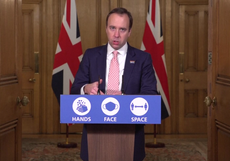England faces tougher Covid-19 rules after Johnson calls emergency meeting on new virus strain, reports say
Measures could include restrictions on travel to and from southeast and London
Your support helps us to tell the story
From reproductive rights to climate change to Big Tech, The Independent is on the ground when the story is developing. Whether it's investigating the financials of Elon Musk's pro-Trump PAC or producing our latest documentary, 'The A Word', which shines a light on the American women fighting for reproductive rights, we know how important it is to parse out the facts from the messaging.
At such a critical moment in US history, we need reporters on the ground. Your donation allows us to keep sending journalists to speak to both sides of the story.
The Independent is trusted by Americans across the entire political spectrum. And unlike many other quality news outlets, we choose not to lock Americans out of our reporting and analysis with paywalls. We believe quality journalism should be available to everyone, paid for by those who can afford it.
Your support makes all the difference.Boris Johnson called an emergency meeting of senior ministers last night and is reportedly mulling travel restrictions in southeast England after being shown alarming evidence on the new coronavirus variant.
After the prime minister declined to rule out the possibility of a third national lockdown post-Christmas, new information suggesting the mutated strain is more easily transmissible was shown to ministers.
According to The Daily Telegraph, Mr Johnson urgently gathered ministers to discuss the possibility of tightening restrictions, amid concerns over the rapid spread of Covid-19 in London. Downing Street is yet to comment on the reports.
Travel curbs aimed at stopping the variant from spreading further across the country are reportedly under discussion, with speculation movement to and from parts of southeast England could be paused, throwing Christmas plans into doubt for millions.
Announcing the new variant’s existence earlier this week, Matt Hancock, the health secretary, said it had been discovered in at least 60 different local authority areas, and warned it could be behind the sharp rise in cases in parts of England despite the recent lockdown.
However, he stressed there was no evidence to suggest it would cause a more serious disease, adding it was “highly unlikely” to impact the vaccine the NHS began administering to patients in priority groups last week.
Sir Mark Walport, a member of the the government's Scientific Advisory Group for Emergencies told BBC Newsnight the new variant appeared to have a “transmission advantage”.
"We know that this is a new variant, it has been seen in other countries but it seems to be quite widespread which suggests that it has got a transmission advantage,” he said. “It does definitely seem possible that this transmits more easily."
Jeremy Hunt, the former Conservative health secretary, told BBC Radio 4’s Today programme that if the government did not want to change the law on festive gatherings, they should consider strengthening the guidance on social distance.
"It is a very difficult, finely-balanced judgment. The biggest worry is what happens indoor in family gatherings and that's where the risks do increase,” he said.
"They have to respond to what is happening on the ground. I think they can be clearer about what is and isn't advisable because it would be an enormous tragedy if we had a spike in deaths at the end of January/February because we took our foot off the pedal this close to having a vaccine."
Scientists have warned that easing restrictions will lead to more deaths. It was reported that the government could seek to strengthen its guidance and urge those in the southeast to cancel festive travel plans, in an announcement expected as soon as Saturday, instead of altering legal rules.
Meanwhile, with some 34 million people in England now living under tier 3 restrictions, The Daily Mail reported on Friday night that ministers are considering tier 4 plans, which could involve the closure of non-essential retail and stronger work-from-home calls.
It cited a government source as saying: “There are lots of things you could add to that – it’s still early days.”
It came as The Independent revealed that London hospitals would run out of critical care beds in the first week of January if infections continued the way they were. Hospitals across the capital have started to cancel operations and are redeploying nurses and doctors to cope with an expected increase in demand.
Porton Down has been studying the new strain of coronavirus in recent weeks, which is thought to have originated in the UK and was first identified by scientists in the Covid-19 Genomics UK (COG UK) consortium in late September.
Professor Sharon Peacock, the director of COG-UK – a government-backed group analysing genome data from some 140,000 coronavirus patients, partly to track mutations – said on Tuesday that there was still “very thin evidence” on the new variant.
But her COG-UK colleague Professor Nick Loman said that “initial modelling has shown that this [variant] is growing faster than” the strain which first originated in Spanish farmers, spread to the UK in the summer and is now the UK’s “dominant strain”.
However, he warned this remained a case of correlation and not causation.
Furthermore, the new variant contains a “striking” 17 mutations – compared with an average of one or two per new variant. “Quite a number of those” are found within the spike protein used to infect human cells, Prof Loman said.



Join our commenting forum
Join thought-provoking conversations, follow other Independent readers and see their replies
0Comments